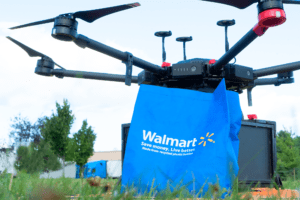
North Carolina has been a leader in drone adoption, from disaster response to the numerous projects the state hosts as part of the UAS Integration Pilot Program. The announcement of Walmart’s commercial drone delivery pilot program in NC this week has put drone programs in North Carolina back in the spotlight – and industry leader Darshan Divakaran says there is more to come for the state and the drone delivery sector.
The following is a guest post by Darshan Divakaran, President of drone education and integration firm Airavat Solutions, and the NC Chapter of AUVSI.
The Race for Dominance in Commercial Drone Delivery has Begun – and North Carolina is the Starting Line
The race for drone delivery has gained even more traction during this pandemic – with consumers, drone companies, and the retail industry seeking contactless delivery options. In 2019, the Federal Aviation Administration (FAA) approved UPS Flight Forward to become the first-ever drone service operating as a commercial airline. UPS later teamed up with CVS Pharmacy to focus its initial drone efforts on medical product delivery.
Walmart is the most recent entrant in this race, joining UPS, Amazon, and CVS. Walmart launched a pilot program in Fayetteville, NC, with Flytrex and Causey Aviation Unmanned, Inc. To this point, the company had maintained a low drone profile, but it’s shown interest in the technology, having filed dozens of patents for drones and testing drones to move around inventory within its warehouses.
This race is more like a marathon than a sprint. There are still significant regulatory and technology limitations to overcome before drone delivery is mainstream, so we shouldn’t expect to see regular drone deliveries nationwide anytime soon. As the industry and retail companies work toward this goal, there should be a focus on making sure there is enough return on investment (ROI) for long-term operations. In the beginning, everything looks “cool” when delivered by a drone, but to keep that momentum and interest going is a challenge.
The Question of Jobs
Estimates show that commercial drone delivery can cut costs as much as 50%, but those savings bring additional questions. How many jobs will also be cut or lost? How many delivery workers, mail carriers, and truck drivers will be put out of work by drones? Drone delivery holds the promise to create a network of new jobs for drone technicians, drone pilots, and others, but these positions require technical training. With Part 135 drone delivery operations a whole new workforce needs to be trained, and this will be the responsibility of the industry and FAA.
Security in Commercial Drone Delivery
Another major factor that will play a role in forming how drone delivery develops is security. The development and advancement of secure software and security programs aimed at preventing hacks are critical to long-term success. It is inevitable that as the commercial drone delivery industry grows, so too will the number of hackers and criminals trying to chip away and interrupt this new advancement. As the race continues the industry and FAA are going to overcome many of these challenges, but not all. This realization is what will truly define what the future of drone delivery is going to be.
No matter who reaches the finish line first in this race, we all win!
North Carolina is world-famous for its contribution to aviation history, providing the perfect conditions for the Wright Brothers’ flight in Kitty Hawk in 1903. Now, North Carolina is contributing to unmanned aviation history as well, providing the same perfect conditions for companies like UPS Flight Forward, Matternet, Zipline, Flytrex, Volans-i, and others. Under the NC UAS Integration Pilot Program led by North Carolina Department of Transportation (NCDOT), these companies have been able to work with the FAA to create the future of drone delivery in the United States. NCDOT and its partners – UPS, Matternet and WakeMed — launched the country’s first ever commercial drone delivery service in March 2019.
Interested in learning more? Join the Airavat and AUVSI NC Linkedin groups to stay updated on initiatives and events.
Miriam McNabb is the Editor-in-Chief of DRONELIFE and CEO of JobForDrones, a professional drone services marketplace, and a fascinated observer of the emerging drone industry and the regulatory environment for drones. Miriam has penned over 3,000 articles focused on the commercial drone space and is an international speaker and recognized figure in the industry. Miriam has a degree from the University of Chicago and over 20 years of experience in high tech sales and marketing for new technologies.
For drone industry consulting or writing, Email Miriam.
TWITTER:@spaldingbarker
Subscribe to DroneLife here.